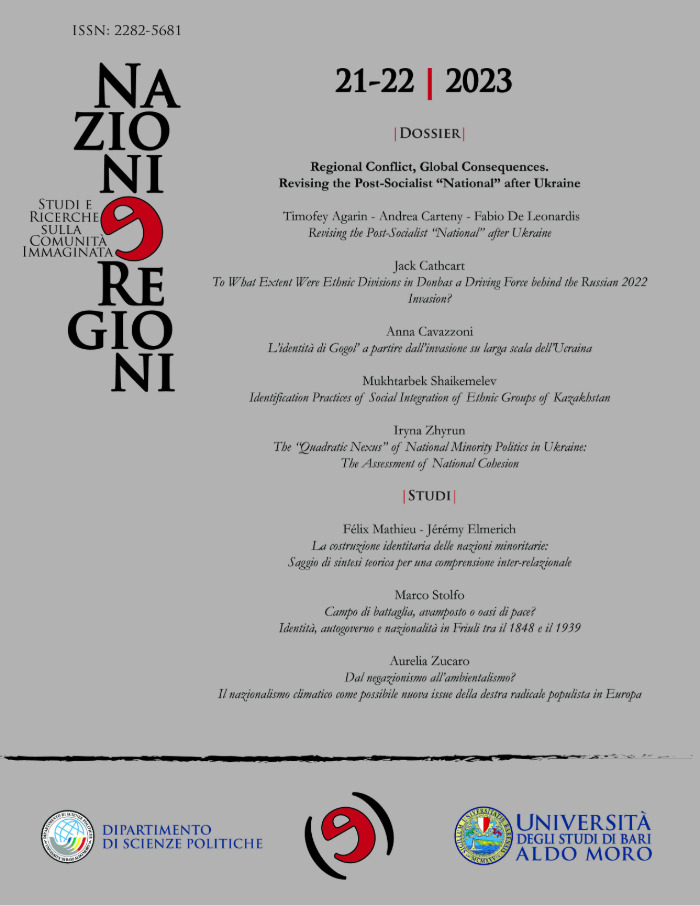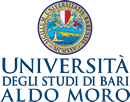Identification practices of social integration of ethnic groups of Kazakhstan <br> <br> L’integrazione sociale dei gruppi etnici in Kazakistan e le loro pratiche di identificazione
DOI:
https://doi.org/10.15162/2282-5681/1936Parole chiave:
Nation-building, ethnic minorities, identity, Kazakh-speaking, Russian-speaking, nation-building, minoranze etniche, identità, kazakofoni, russofoniAbstract
The main objective of this article is to study the relationship of perception by ethnic minorities of the evolution of the state policy of the formation of civic identity in the direction of the leading role of the language and culture of Kazakhs with their intercultural practices of integration into Kazakhstani society. Identification practices of integration of ethnic minorities go through gradual changes, because the discourse of ethnodemographic nationalization of the state shifts its focus, demonstrating the important role of Kazakhs in the nation-building process, providing a new framework for building the life practices of ethnic minorities. The sociological data presented in the article show that for the vast majority of Russians and representatives of other ethnic groups, «the creation of a single community without discrimination on ethnic grounds» is the most preferred nation-building policy. Although Kazakhstani ethnic groups are more comfortable with the primacy of the discourse of a «Kazakhstani nation», they are increasingly forced to give preference to the necessity to recognize a hybrid nation-building policy based on the integrating role of the state language and Kazakh culture with the preservation of ethnocultural characteristics. The Russian-Ukrainian conflict significantly contributed to the acceleration of this process.
L’obiettivo principale di questo articolo è di studiare la relazione tra la percezione da parte delle minoranze etniche dell’evolversi della politica statale di formazione di un’identità civica orientata verso un ruolo guida della lingua e cultura kazake e le loro pratiche interculturali di integrazione nella società kazaka. Le pratiche di identificazione dell’integrazione delle minoranze etniche attraversano cambiamenti graduali, perché il discorso della nazionalizzazione etnodemografica dello Stato modifica il centro della propria attenzione, dimostrando il ruolo importante dei kazaki nel processo di costruzione della nazione e fornendo un nuovo contesto per la costruzione delle pratiche quotidiane delle minoranze etniche. I dati sociologici presentati nell’articolo mostrano che per la vasta maggioranza dei russi e dei membri di altri gruppi etnici la politica di costruzione della nazione preferita è «la creazione di una singola comunità senza discriminazioni basate sull’etnia». Anche se i gruppi etnici del Kazakistan sono maggiormente a proprio agio con il prevalere del discorso di una «nazione di tutti gli abitanti del Kazakistan», sono sempre più costretti a dare preferenza alla necessità di riconoscere una politica di costruzione nazionale ibrida, basata sul ruolo integrante della lingua di stato e della cultura kazaka associata alla conservazione delle caratteristiche etnoculturali. Il conflitto russo-ucraino ha contribuito significativamente ad accelerare questo processo.
Riferimenti bibliografici
Alekseenko A. N. (ed.) (2001), Etnosy Kazakhstana: istoriko-demograficheskij spravochnik, Astana, Elorda.
Assambleya Naroda Kazakhstana (n.d.), «Kazahstanskaya model’ obshchestvennogo soglasiya i obshchenacional’nogo edinstva N.A. Nazarbaeva»,
https://assembly.kz/ru/kazakhstanskaya-model-obshchestvennogo-soglasiya-i-obshchenatsionalnogo-edinstva-n-a-nazarbaeva_ru (last visit 30-XII-2023).
Barrington L. W. - Herron E. S. - Silver B. D. (2003), «The Motherland Is Calling: Views of Homeland among Russians in the near Abroad», World Politics, 55, No. 2, pp. 290-313.
Blackburn M. (2019), «Discourses of Russian-speaking Youth in Nazarbayev’s Kazakhstan: Soviet Legacies and Responses to Nation-building», Cеntral Asian Survey, 38, No. 2, pp. 217-236
DOI: 10.1080/02634937.2019.1615409
Brubaker R. (2011), «Nationalizing States Revisited: Projects and Processes of Nationalization in Post-Soviet States», Ethnic and Racial Studies, 34, No. 11, pp. 1785-1814,
https://doi.org/ 10.1080/ 01419870.2011.579137
Cheskin A. - Kachuyevski A. (2019), «The Russian-Speaking Populations in the Post-Soviet Space: Language, Politics and Identity», Europe-Asia Studies, 71, No. 1, pp. 1-23,
DOI: 10.1080/ 09668136.2018.1529467
Committee on Statistics of the Ministry of National Economy of the Republic of Kazakhstan (2020), «The Population of the Republic of Kazakhstan by Individual Ethnic Groups at the Beginning of 2020», https://stat.gov.kz/ (last visit 30-XII-2023).
Council of Europe (2023), Chart of Signatures and Ratifications of Treaty 157 «Framework Convention for the Protection of National Minorities»,
https://www.coe.int/en/web/conventions/full-list?module=signatures-by-treaty&treatynum=157 (last visit 30-XII-2023)
Dave B. (2007), Kazakhstan: Ethnicity, Language and Power, London-New York, Routledge.
Diener A. (2006), «Homeland as Social Construct: Territorialization among Kazakhstan’s Germans and Koreans», Nationalities Papers, 34, No. 2, pp. 201-235,
https://doi.org/10.1080/ 00905990600720294
Diener A. (2016), «Imagining Kazakhstani-stan: Negotiations of Homeland and Titular-Nationality», in Laruelle M. (ed.), Kazakhstan in the Making: Legitimacy, Symbols, and Social Changes, London, Lexington Books, pp. 131-154.
Doktrina Natsional’nogo edinstva Kazakhstana (2010), 10-IV,
https: // online. zakon. kz/ document/? doc_id= 30501158 # pos=6;-106 (last visit 30-XII-2023).
Dunaev V. - Bizhanov A. - Shaykemelev M. (2019), «The Space of Ethnonational Identities of Kazakhstan Society: Principles and Models of Stratification», Central Asia and the Caucasus. Journal of Social and Political Studies, 20, No. 4, pp. 107-121.
Dunaev V. - Kurganskaya V. - Shaikemelev М. (2019), «Identity Politics in Managing the System Risks of Nation-Building: On the Example of the Republic of Kazakhstan», Baltic Journal of European Studies, 9, No. 1 (26), Spring, pp. 99-114,
https:// doi.org/ 10.1515/bjes-2019-0006
Isabayeva S. (2019), «Est’ li v Kazakhstane natsional’naia politika? I chto s nej delat’?», Central Asia Monitor, 12-IV, https://camonitor.kz/32897-est-li-v-kazahstane-nacionalnaya-politika-i-chto-s-ney-delat.html (last visit 30-XII-2023).
Kamalov A. K. (2016), Kazakstan Ujgurlary / Ujgury Kazahstana, Astana.
Kamalov A. K. - Imyarova Z. S. (2016), Kazakstan Dungenderi / Dungane Kazahstana, Astana.
Kim G. N. (2013), Izbrannye trudy po koreevedeniyu, Almaty.
Kim G. N. (ed.) (2018), Diaspory Kazakhstana: Edinstvo v mnogoobrazii, Almaty, Kazak universiteti.
Kolstø P. (1999), «Bipolar societies?», in Id. (ed.), Nation-building and Ethnic Integration in Post-Soviet Societies: An Investigation of Latvia and Kazakhstan, Boulder CO, Westview Press, pp. 16-45.
Kosmarskaya N. (2014), «Russians in Post-Soviet Central Asia: More ‘Cold’ Than the Others?», Journal of Multilingual and Multicultural Development, 35, No. 1, pp. 9-26,
https://doi.org/10.1080/ 01434632.2013.845195
Laitin D. (1998), Identity in Formation: The Russian-speaking Populations in the Near Abroad, Ithaca NY-London, Cornell University Press.
Laitin D. (1999), «The Cultural Elements of Ethnically Mixed States: Nationality Reformation in the Soviet Successor States», in Steinmetz G. (ed.), State/Culture: State-Formation after the Cultural Turn, Ithaca NY, Cornell University Press, pp. 291-320.
Laruelle M. (2014). «The Three Discursive Paradigms of State Identity in Kazakhstan. Kazakhness, Kazakhstannes and Transnationalism», in Omelicheva M. (ed.), Nationalism and Identity Construction in Central Asia. Dimensions, Dynamics and Directions, Lanham MD, Lexington Books, pp. 1-20.
Laruelle M. - Peyrouse S. [Laruel M. - Peiruz S.] (2007), “Russkij vopros” v nezavisimom Kazakhstane: istoriia, politika, identichnost’, Moskva, Natalis.
Oka N. (2007), Managing Ethnicity under Authoritarian Rule: Transborder Nationalisms in Post-Soviet Kazakhstan, Institute of Developing Economies JETRO, Chiba,
https://www.ide.go.jp/English/Publish/Reports/InterimReport/2006/2006_04_31.html (last visit 30-XII-2023).
Prezident Respubliki Kazakhstan (2012), «Strategiya “Kazahstan-2050”: novyj politicheskij kurs sostoyavshegosya gosudarstva. Poslanie Prezidenta Respubliki Kazahstan - Lidera Nacii N.A. Nazarbaeva narodu Kazahstana», 14-XII-2012,
https:// adilet.zan.kz/ rus/docs/ K1200002050 (last visit 30-XII-2023).
Prezident Respubliki Kazakhstan (2019), «Poslanie Glavy gosudarstva Kasym-Zhomarta Tokaeva narodu Kazakhstana “Konstruktivnyj obshchestvennyj dialog – osnova stabil’nosti i protsvetaniya Kazahstana”», 2-IX,
https://www.akorda.kz/ru/addresses/addresses_of_president/poslanie-glavy-gosudarstva-kasym-zhomarta-tokaeva-narodu-kazahstana (last visit 30-XII-2023).
Shaikemelev M. (2013), Kazakhskaya identichnost’, Almaty, Institut Filosofii, Politologii i Religiovedeniia KN MON RK.
Shaikemelev M. (2020), Kazakhskaia identichnost’ v kontekste modernizatsii obshchestva, Almaty, Institut Filosofii, Politologii i Religiovedeniia KN MON RK (2nd ed.).
Tojbayeva Zh. N. (ed.) (2016), Narod Kazakhstana: Entsiklopediia, Almaty, Kazak entsiklopediiasy.
Downloads
Pubblicato
Fascicolo
Sezione
Licenza
Nazioni e regioni è una rivista open access che applica la licenza Creative Commons CC BY-NC-ND 4.0 a tutti i contenuti pubblicati.
Nazioni e regioni is an open-access journal that applies the Creative Commons CC BY-NC-ND 4.0 licence to all published contents.







